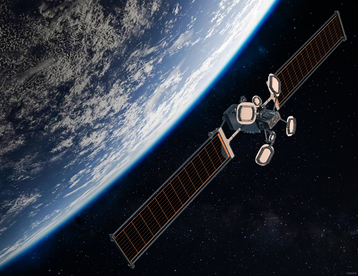Swedish satellite communications firm Ovzon has launched services from its debut geostationary (GEO) broadband satellite.
“Ovzon’s proprietary satellite Ovzon 3 has reached its orbital position in the geostationary arc,” the company said recently. “After a few weeks of final in-orbit testing, the satellite is now ready for commercial service.”
The first delivery of SATCOM-as-a-Service from Ovzon 3 will be to the French tactical police unit GIGN (Groupe d'Intervention de la Gendarmerie Nationale) which will use the service with immediate effect to meet its advanced connectivity needs during the 2024 Olympics in France.
After launching aboard a SpaceX rocket from Florida in January, the 1,500 kilogram satellite reached its orbit slot in June. The satellite includes the reprogrammable Ovzon on-board-processor as well as five steerable beams in the Ku-Band.
Ovzon said its Ovzon T7 terminal was showing test results of throughput of 10Mbps on uplink and 135Mbps on downlink on the satellite.
“This is a moment of great pride for our company. With the satellite now ready for commercial service, Ovzon is entering a new and exciting phase,” said Per Norén, CEO of Ovzon. “Supporting the well-renowned French elite organization, GIGN, throughout the Summer Games with Ovzon SATCOM-as-a-Service is not only a great honor but also the perfect first use-case. It is the ultimate demonstration of our commitment to our customers by connecting the world’s critical missions via satellite.”
Founded in 2006, Ovzon currently leases capacity from partner satellite operators such as Intelsat. Announced in 2018 and originally set to launch in 2021, the company’s Maxar-made satellite was subject to several delays, forcing the company to seek extensions with the ITU.
The company said Ovzon 3 is the first privately funded and developed Swedish geostationary satellite ever to be launched.
GIGN serves as France's primary counterterrorism and hostage rescue unit, and will be providing security over the Olympics.
“Ovzon’s advanced mobile satellite terminals and high-performing satellite will support different scenarios and users around the Paris area. Ovzon’s technology and experience is a great match for our needs, and we are looking forward to implementing their SATCOM-as-a-Service,” said General Ghislain Réty, GIGN Commander.
In other recent satellite news:
– Elon Musk recently used Starlink satellites to stream on X.
– Amazon’s Project Kuiper has pushed back the launch of its first commercial satellites.
– Intelsat has signed a contract with Starfish Space for a geostationary satellite servicing mission. Due to launch in 2026, Starfish Space’s ‘Otter’ rescue satellite will attach itself to an already retired Intelsat craft to validate that the system can work. It will then be used for a mission on an unnamed satellite.
– Researchers are suggesting a Marsian LEO constellation to provide connectivity for future missions to Mars.
– An EU-funded study found that launching data centers into orbit is technically, economically, and environmentally feasible.
– Satellite builder Terran Orbital has received notice from the New York Stock Exchange (NYSE) about its share price. Failing to keep its stock above $1 for 30 days over the next six months could result in de-listing from the NSYE. The company’s stock is currently trading at $0.87 and hasn’t gone above $1 since the notice.
– Gilat Satellite Networks is acquiring in-flight connectivity terminal supplier Blu Solutions.
– An application has been filed for a new ground station near the Baltasound airstrip on the Scottish island of Unst. The application has come from the SaxaVord Spaceport.
– Chinese LEO satellite operator Geespace is partnering with Oman-based satellite services provider Azyan Telecom. The companies plan to launch services in Oman and other Middle Eastern and North African countries by 2025. Geespace – a subsidiary of Chinese carmaker Zhejiang Geely Holding Group – is planning to build a LEO constellation that will ultimately comprise 168 satellites – around 21 are currently in orbit.
– Switzerland’s Swisscom is working with French IoT firm Actility and EchoStar Mobile to expand its LoRaWAN IoT footprint across Europe.
– French space startup Skynopy has raised $3.1 million for its ground station connectivity platform.
– Burning up lots of LEO satellites in orbit could damage the Ozone Layer, scientists have warned.
– Satellite firm Planet has laid off around 180 employees, or 17 percent of its workforce, in an effort to reduce costs.
– A Russian satellite in LEO broke up, creating more than 100 pieces of trackable debris. Resurs P1 broke up on June 26. No cause was given by USSPACECOM, which announced the event. Launched in 2013, P1 was decommissioned in 2021.
– Spacium aims to launch a satellite refueling station into orbit in 2027.







